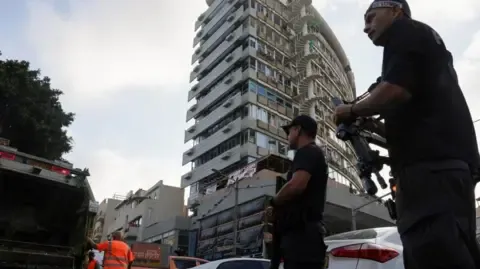In a dramatic escalation of violence, a drone attack has claimed the life of a man and injured at least eight others in central Tel Aviv, Israel. The assault marks a significant development in the ongoing conflict, with Iranian-made unmanned aerial vehicles (UAVs) reportedly involved.
Details of the Attack
The attack, which occurred at 03:12 local time (00:12 GMT), struck a block of flats in Tel Aviv. The UAV, identified by Israeli military officials as Iranian-made and modified for long-distance travel, was reportedly launched by the Houthi movement in Yemen. This represents a considerable escalation in Houthi operations against Israel, which had previously been limited to missile and drone interceptions.
Footage captured from the beach shows the drone approaching over the Mediterranean Sea before disappearing behind buildings, followed by a significant explosion. Pictures from the aftermath depict extensive damage, including blown-out windows, damaged cars, and debris scattered across the street. The man killed in the attack, identified as Yevgeny Ferder, 50, had recently moved to Israel from Belarus.
Military and Government Responses
The Israeli military has faced severe criticism following the attack. An official admitted that while the incoming drone was detected, a “human error” led to its failure to intercept. The Times of Israel quoted the Israeli Air Force acknowledging the incident as a severe lapse in their defense systems. Senior military correspondent Yonah Jeremy Bob highlighted the shock and surprise within the Israeli defense establishment.
Israeli Defence Minister Yoav Gallant convened a security briefing with top officials in response to the incident. He assured that efforts would be made to reinforce defense mechanisms and that justice would be pursued against those responsible. Gallant also hinted at potential retaliatory measures, including discussions on intelligence and operational responses.
Houthi Claims and Threats
The Houthi movement, based over 1,000 miles away in Yemen, claimed responsibility for the strike. A spokesperson for the Houthis, Yahya Saree, announced that the attack was carried out using a new type of drone capable of evading interception systems. He warned that Tel Aviv would be a primary target and labeled the city as “an unsafe area.”
Local Reactions and Security Measures
In the wake of the attack, Tel Aviv is on high alert. The city’s mayor has heightened security measures, and the Israeli military has increased air patrols. Local resident Alon described the incident as causing significant shaking and damage to several buildings in his area.
Broader Conflict Context
The attack follows a series of escalations in the region. Recently, the Israeli military confirmed the killing of a senior Hezbollah commander in southern Lebanon, leading to further border exchanges of fire. Hezbollah and the Houthis, both Iranian-backed, have framed their actions as solidarity with the Palestinians amid the ongoing conflict.
FAQ
1. What happened in the drone attack on Tel Aviv?
A drone attack hit a block of flats in central Tel Aviv, killing one person and injuring at least eight others. The UAV, reportedly Iranian-made and modified for long distances, was allegedly launched by the Houthi movement from Yemen.
2. Why did the Israeli military fail to intercept the drone?
The Israeli military detected the incoming drone but failed to intercept it due to “human error.” The incident has been described as a severe lapse in the defense system.
3. What was the response from the Israeli government?
Israeli Defence Minister Yoav Gallant held a security briefing and indicated potential retaliatory measures. The Israeli military is increasing air patrols, and Tel Aviv’s mayor has placed the city on high alert.
4. How has the Houthi movement responded?
The Houthis claimed responsibility for the attack and announced that they used a new drone capable of bypassing interception systems. They also threatened further attacks, labeling Tel Aviv as an unsafe area.
5. What is the broader context of this attack?
The attack is part of a larger escalation in regional conflicts, including recent exchanges of fire between Israel and Hezbollah. Both Hezbollah and the Houthis are Iranian-backed and have framed their actions as support for Palestinians amidst the ongoing conflict in Gaza.


